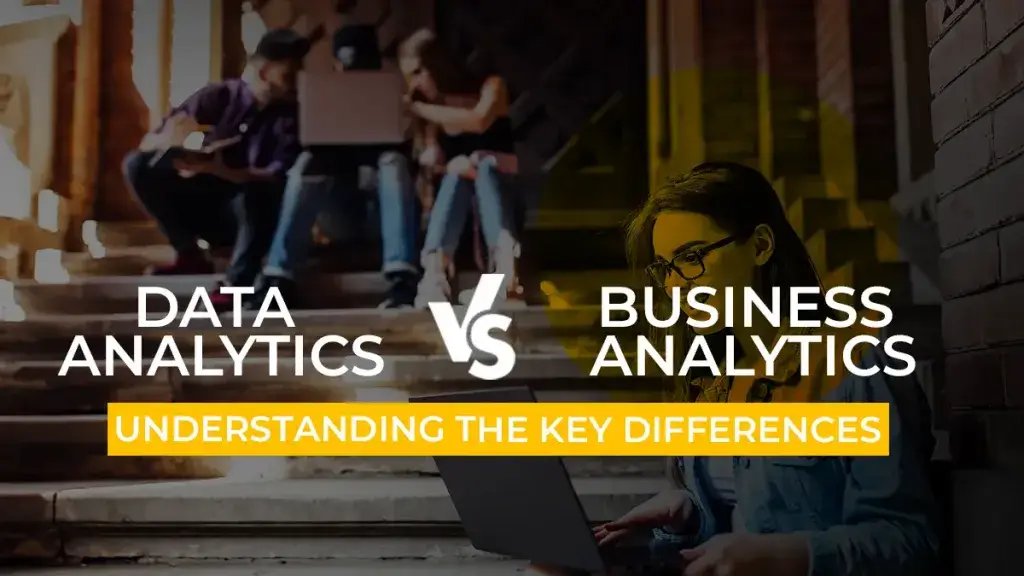Business Analytics – An Exhaustive Guide
In the 21st century, data is the currency for businesses. No matter if you are an eCommerce business, retail business, or real estate business, data is required by every business. However, data is not enough. Businesses need advanced methods and technologies to use that data to drive business decisions. These processes that help businesses to make smart business decisions based on the acquired data come under business analytics
What is Business Analytics?
Business analytics is considered a superpower for businesses these days.
It is all about utilizing data to understand what’s happening in a company and what are the reasons behind it You can consider it as some detective work but for a business instead of crime that will help in collecting, processing, and analyzing data to uncover insights that can help companies make better decisions and solve problems. These insights can be about anything from customer behavior to supply chain efficiency.
Considering its high level of importance, business analytics is like a trusted advisor for decision-makers in the industry and plays a very important role in seeing the big picture and understanding the potential outcomes of different options, so that the business can choose the best path forward.
In fact did you know that business analytics that is powered by AI and ML acts as an even more strategic ally for decision-makers? Yes, it’s like having a brilliant assistant who can sift through vast amounts of data, spot patterns, and predict future trends.
AI and ML algorithms make it possible to find insights that humans might miss or take much longer to discover. They help decision-makers not only understand historical data but also forecast potential outcomes with greater accuracy. So by using AI and ML in business analytics decision-makers can make more informed choices, mitigate risks, and seize opportunities.
As per stats, the employment of business analysts will rise by 11% from 2019 to 2029. Therefore, if you are good with numbers, being a business analyst can be a fruitful job for you.
Importance of Business Analytics
In this section let’s look at the importance of business Analytics in more depth.
-
Data-Driven Decision Making
- Data-driven decision-making implies using facts and data to guide choices and actions within a business. Instead of relying solely on intuition or past experiences, companies analyze data to make informed decisions.
For example, a retail store might use sales data from their previous months or years to predict which products will be popular during certain seasons or events. Therefore by analyzing this data, they can adjust their inventory levels and marketing strategies accordingly, which can lead to increased sales and profitability for them in the future.
-
Identifying Trends and Patterns
- Analyzing data helps businesses discover trends and patterns that might not be immediately apparent to them. This can include trends in customer behavior, market fluctuations, or even internal operational patterns.
For example, an online streaming service might notice through data analysis that certain genres of movies or TV shows are gaining popularity among subscribers. By having this information, they can invest more resources into acquiring content in those genres which will result in them attracting and retaining more subscribers.
-
Enhancing Operational Efficiency and Performance
- Business analytics can significantly improve the efficiency and performance of a company’s operations. This is done by analyzing various data points related to processes, resources, and performance metrics so that businesses can identify areas where improvements can be made.
For example, a logistics company might analyze data on delivery routes, vehicle utilization, and fuel consumption to optimize its transportation operations. By finding more efficient routes and scheduling deliveries more effectively, they can reduce costs and improve delivery times, which will ultimately enhance their overall operational performance.
-
Gaining Competitive Advantage
- By effectively using business analytics a business analyst can provide companies with a competitive edge in their respective industries. This is possible by analyzing data about customers, competitors, and market trends so that businesses can identify opportunities and threats more quickly and accurately.
For example, a retail chain might use data analytics to watch its competitors’ pricing strategies and customer feedback in real-time. Then by analyzing this information, they can change their own pricing and marketing tactics to stay ahead of the competition and attract more customers.
Well, it seems like you might be interested in pursuing a career in business analytics! Right?
If you’re looking for a top course in this field then you can consider checking out the Business Analytics course offered by IMS Proschool. Ge trained & placed in just 2.5 hrs with online/offline business analytics classes near you.
Types of Business Analytics
-
Descriptive Analytics
Descriptive analytics concentrates on comprehending what has occurred in the past.
- It involves studying historical data to attain insights into trends, patterns, and relationships.
- This type of analysis provides a summary of past events and is often used to answer questions like “What happened?” or “What is the current status?”
- Example: A retail store analyzes its sales data from the past year to understand which products sold the most, which regions had the highest sales, and which marketing campaigns were most effective. This helps the store understand its current performance and make informed decisions for the future.
-
Predictive Analytics
Predictive analytics is about forecasting future outcomes based on historical data and statistical algorithms.
- It involves analyzing past data to make predictions about future events or trends.
- This type of analysis helps businesses anticipate potential outcomes and take proactive measures.
- Example: An insurance company uses predictive analytics to assess the risk of insuring a customer based on factors such as age, health history, and lifestyle habits. By studying historical data on similar customers and their claim history, the company can predict the likelihood of a customer filing a claim in the future, enabling them to adjust premiums accordingly.
-
Prescriptive Analytics
Prescriptive analytics goes further than just predicting future outcomes by suggesting measures to optimize those outcomes.
- It involves analyzing data to determine the best course of action to achieve a specific goal.
- This type of analysis helps businesses make data-driven decisions and take actions that lead to desired outcomes.
- Example: A delivery company uses prescriptive analytics to optimize its delivery routes. So by analyzing data on factors such as traffic patterns, delivery locations, and vehicle capacities, the company can determine the most efficient routes for its drivers to minimize fuel costs and delivery times. This helps the company improve operational efficiency and customer satisfaction.
Therefore, descriptive analytics looks at the past, predictive analytics forecasts the future, and prescriptive analytics recommend actions to achieve desired outcomes. Together, these types of business analytics help companies make better decisions, improve performance, and gain a competitive edge in the market.
Well, as you know Business analytics is continuously developing and so is its impact on the various types of business analytics so let’s have a look at some emerging trends shaping its future.
Emerging Trends in Business Analytics in 2024
- Artificial Intelligence and Machine Learning: Businesses are increasingly adopting AI and machine learning algorithms to analyze large datasets and derive actionable insights.
- Real-Time Analytics: With advancements in technology, businesses are adopting real-time analytics to make faster and more informed decisions based on up-to-date data.
- Big Data Analytics: The volume, velocity, and variety of data are continuously increasing, which is leading to a greater emphasis on big data analytics techniques and technologies to extract valuable insights.
- Data Visualization and Storytelling: Data visualization tools and techniques are becoming more sophisticated which is enabling businesses to communicate insights more effectively and tell their audience influential stories with data.
- Ethical and Responsible Analytics: There’s a growing awareness of the importance of ethical and responsible use of data in analytics as businesses are not days focusing on ensuring privacy, transparency, and fairness in their analytics practices.
Well, you know by now that analyzing data is no easy task, and therefore gaining the necessary skills in this field is necessary for success in your job role.
So don’t worry about how you will learn these skills and just consider registering in a well-structured business analytics course to improve your learning and strengthen your CV. One such course worth exploring is offered by IMS Proschool. Their Active Learning methodology highlights hands-on experience that allows you to learn by doing and applying skills directly.
With a focus on real-world business scenarios and collaborative group work their students gain practical insights and become industry-ready professionals. Many alumni of IMS Proschool have gone on to work in reputed companies like EY and TCS which showcases the effectiveness of this program.w
Also Read – Understanding the Key Differences Between Data Analytics and Business Analytics
Business Analytics Tools
Well, there are several popular business analytics tools and platforms available that help businesses collect, analyze, and present data to make informed decisions. So let’s have a look at some popular ones:
Tableau: Tableau is a data visualization tool that allows users to create interactive dashboards and reports to explore and analyze data visually.
QlikView/Qlik Sense: QlikView and Qlik Sense are data discovery and visualization tools that help users explore and analyze data to uncover insights and make data-driven decisions.
IBM Cognos Analytics: Cognos Analytics is a business analytics platform that provides a suite of tools for reporting, analysis, and dashboarding.
MicroStrategy: MicroStrategy is a business intelligence and analytics platform that offers a wide range of capabilities, including reporting, dashboarding, and predictive analytics.
SAP BusinessObjects: BusinessObjects is a suite of business analytics tools that includes reporting, analytics, and data visualization capabilities.
Also Read – Top 8 Tools Every Business Analyst Should Use In 2024 To Solve Problems
Business Analyst Roles
-
Responsibilities and Duties
As a business analyst, your main job is to understand how a company works and find ways to make it better.
This involves:
-
- Talking to different people in the company to understand their needs and problems.
- Analyzing data to find patterns and trends that can help solve problems or improve processes in the company.
- Writing reports and making presentations to explain your findings and recommend improvement solutions.
-
Skills and Qualifications Required
To be a good business analyst, you need certain skills and qualifications, such as:
-
- Strong communication skills to talk to different people and explain your ideas clearly.
- Analytical skills to understand complex data and find solutions.
- Problem-solving skills to determine issues and come up with effective solutions.
- Knowledge of business processes and how companies operate
- A degree in business, economics, or a related field is often required, but some companies may also value experience or certifications in business analysis.
Also Read – Top 12 Skills Every Business Analyst Should Possess
-
Career Growth Opportunities
Business analysts are in high demand in today’s job market because they help companies understand their business better and make smarter decisions. In fact different types of companies hire business analysts, including big corporations, small businesses, banks, technology firms, and even consulting companies.
Being a business analyst can lead to various career opportunities, such as senior business analyst roles, management roles as well as specialized roles in areas like data analysis, project management, or strategy development.
Salaries for business analysts in India vary based on various factors like experience, location, industry, etc. Well, beyond these competitive salaries, the perks of being a business analyst in India are manifold. It includes the opportunity to work on diverse projects, collaborate with cross-functional teams, retirement plans, performance-based bonuses, flexible work arrangements and a lot of travel opportunities in India and abroad to visit clients.
So after reading the above point you know that being a business analyst offers a lot of opportunities for growth and development in your career.
But wait!
You can also easily acquire these skills from industry experts affiliated with prestigious institutions like IITs and IIMs by enrolling in the Business Analytics course offered by IMS Proschool. Yes, their course provides access to top faculty members from the industry who offer valuable insights and expertise to ensure that you receive high-quality education and training in the field of business analytics.
Business Analyst Salaries
Financial incentives frequently motivate our career decisions and play an important role in driving individuals to seek lucrative opportunities in their preferred sectors. So under this section let’s have a look into the salary patterns of business analysts and the factors shaping them.
Several factors can influence the salary of a business analyst:
- Experience: Typically, the more experience you have as a business analyst, the higher your salary will be. Senior business analysts with several years of experience often command higher salaries than entry-level analysts.
- Education and Qualifications: Holding advanced degrees or certifications in business analysis or related fields can lead to higher salary offers. Certifications such as Certified Business Analysis Professional (CBAP) or Project Management Professional (PMP) can demonstrate expertise and boost earning potential.
- Industry: Salaries for business analysts can vary depending on the industry they work in. Industries like finance, consulting, and technology tend to offer higher salaries for business analysts compared to sectors like non-profit or government.
- Company Size: Business analyst salaries can also vary based on the size and type of the company. Large corporations or tech startups may offer higher salaries and additional perks compared to smaller companies or non-profit organizations.
- Location: The cost of living and demand for business analysts can differ significantly based on location. Cities with high living costs or thriving business sectors may offer higher salaries to attract talent.
- Skills and Specializations: Business analysts with specialized skills or expertise in areas such as data analytics, project management, or specific industries may command higher salaries due to their in-demand skills.
Average Annual Salary of Business Analysts by Industry
- Banking: Rs. 10.8 Lakhs per annum
- Internet: Rs. 10 Lakhs per annum
- Financial Services: Rs. 8.1 Lakhs per annum
- IT Services & Consulting: Rs. 7.9 Lakhs per annum
- Software Product: Rs. 7.7 Lakhs per annum
Average Annual Salary of Business Analysts on the basis of their City
- Bangalore: Rs. 8.7 Lakhs per annum
- Pune: Rs. 8.3 Lakhs per annum
- Mumbai: Rs. 8.0 Lakhs per annum
- Hyderabad/Secunderabad: Rs. 7.9 Lakhs per annum
- Chennai: Rs. 7.2 Lakhs per annum
Average salaries of business analysts based on experience:
- 0 – 1 Year: Rs. 2 – 5 Lakhs per annum
- 1 – 3 Years: Rs. 5 – 6 Lakhs per annum
- 3 – 5 Years: Rs. 6.4 – 7.1 Lakhs per annum
- 5 – 8 Years: Rs. 7.7 – 8.2 Lakhs per annum
- 9+ Years: Rs. 9 Lakhs per annum and above
Business Analyst Work
In this section, we’ll have a look into the multifaceted role of business analysts by examining their responsibilities, skills, and impact within organizations.
-
Typical Tasks and Projects
Business analysts typically engage in various tasks and projects, including:
-
- They conduct interviews and workshops with stakeholders to gather requirements for new projects or system enhancements.
- They are involved in examining data to identify trends, patterns, and insights that can inform decision-making.
- Developing business cases and feasibility studies to assess the potential impact and ROI of proposed initiatives.
- Cooperating with project managers, developers, and other team members to ensure that project deliverables align with business objectives.
- Facilitating meetings and discussions to elicit feedback and resolve issues throughout the project lifecycle.
- Documenting business processes, requirements, and user stories using tools like flowcharts, diagrams, and requirement management systems.
-
Collaborative Roles with Other Departments
Business analysts work closely with various departments to achieve organizational goals:
-
- With IT: Collaborating with IT teams to translate business requirements into technical specifications and ensure the successful implementation of software solutions.
- With Operations: Partnering with operations teams to streamline processes, optimize workflows, and enhance operational efficiency.
- With Marketing: Providing data-driven insights to support marketing strategies, campaign planning, and customer segmentation efforts.
- With Finance: Assisting finance departments with financial analysis, budgeting, forecasting, and cost-benefit analysis for proposed projects.
-
Challenges and Opportunities
In their role, business analysts encounter specific challenges and opportunities:
-
- Challenges: Facing resistance to change from stakeholders, reconciling conflicting priorities and expectations from different departments, navigating complex organizational structures and even managing demanding work schedules that last for long hours.
- Opportunities: Business analysts have the opportunity to make tangible impacts on business outcomes by identifying the opportunities for process improvement, innovation, and cost reduction. They can develop versatile skills in analysis, problem-solving, communication, and stakeholder management that are transferable across industries and roles, which enhances their personal and professional growth. Moreover, the role may offer personal opportunities such as extensive travel, exposure to diverse business environments, and the chance to build a broad network of professional contacts.
Also Read – Masters Vs Professional Certificate Vs MBA in Business Analytics
Growth support mentors help to improve learning and enhance career aspirations as per the candidates’ potential.
FAQ’s
Need More Info? Read Our Latest Blogs
Explore, Share And Enjoy Our Curated Content
A business analyst is a professional who bridges the gap between business objectives and technical implementations, analyzing and interpreting data to provide insights, recommendations, and [...]
Have you ever wondered how big companies like Google and Reliance make important decisions for their businesses? Well, a major part of their decision-making is based on data-driven [...]
Hey there, fellow BCom warriors! Are you ready to make the most of your commerce degree? We know that BCom alone might not feel like [...]




